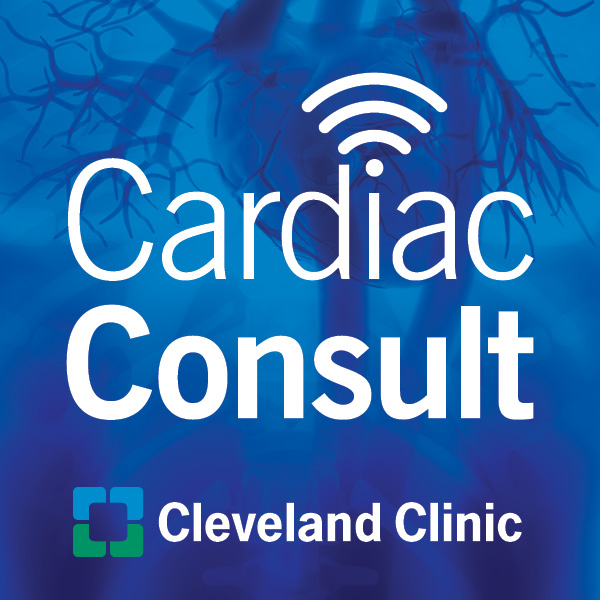Renal Denervation: A New Treatment Option for Hypertension

In November 2023, the renal denervation procedure received FDA approval in the United States. This procedure works to lower blood pressure by denervating the sympathetic nerves surrounding the renal arteries. Luke Laffin, MD, co-director for the Center for Blood Pressure Disorders discusses this exciting new option for some patients and what to expect.
Learn about the Center for Blood Pressure Disorders.
Subscribe: Apple Podcasts | Buzzsprout | Spotify
Renal Denervation: A New Treatment Option for Hypertension
Podcast Transcript
Announcer:
Welcome to Cleveland Clinic Cardiac Consult, brought to you by the Sydell and Arnold Miller Family Heart, Vascular and Thoracic Institute at Cleveland Clinic.
Luke Laffin, MD:
My name's Luke Laffin, I'm a Preventive Cardiologist at the Cleveland Clinic and Co-Director of the Center for Blood Pressure Disorders. It's my pleasure today to talk to you about renal denervation and what we offer at the Cleveland Clinic. Many of you listening to this or watching this podcast may know renal denervation has a little bit of a rocky history. The initial studies suggested these very large decreases in blood pressure. We're talking 20, 30 millimeters of mercury. And then what we saw with the SYMPLICITY HTN-3 trial, which was published in the early 2010s, was that definitely not that much blood pressure lowering and actually it wasn't any better than placebo compared to that catheter that was used. And there was a variety of reasons why that was the case, and we won't belabor those. Somewhat the wrong patients were selected, probably the catheter wasn't effective. There was a lot of looking back at the field amongst the companies that create the devices and academic leadership as well and saying, what do we need to do to really demonstrate that this procedure is effective in a significant portion of patients?
And from that really has come two technologies that were recently FDA approved. One is an ultrasound-based renal denervation device and the other is a radiofrequency-based device. The clinical trial data is similar, although there are some nuances in terms of patient population and study endpoints. But the take-home is that the procedure was safe in the RADIANCE trials, which was the ultrasound-based renal denervation studies. And then in the Symplicity Spyral trials, which was radiofrequency ablation, they showed that there was significant blood pressure lowering in people that weren't on any medications. How do we think about it from a referring physician perspective? And how do we think about it from a blood pressure disorder specialist? And then how do we think about it from an interventional cardiologist perspective?
Maybe I'll start with talking about, well, how do we think about it from a referring physician perspective? There's two real groups of patients that stand to benefit from this technology right now and are most likely to be covered from insurance reimbursement perspective. The first are those individuals with resistant hypertension. So those are individuals that are on at least three medications and their blood pressure remains uncontrolled. One of those is typically a diuretic. The other group of patients where we've seen some very good success with are the patients that we all know too well, the ones where they've had 15, 20, 25 blood pressure medicines that they've tried and everything causes some type of problem. Real or perceived, it doesn't really matter what their intolerance is, they're not going to take it. So that's also another group of individuals that we've seen benefit and have really been interested in the procedure and we've seen good results.
When we think about these folks before they come to me in the Center for Blood Pressure Disorders, one thing to really engage or assess are for secondary causes of hypertension. Do they have renal artery stenosis? Do they have severe untreated sleep apnea? Do they have primary aldosteronism? Which is chronically or just severely underdiagnosed in this country. If they've had a basic secondary workup, then they're very appropriate to come see us in clinic. Now, anyone with any type of renal artery abnormality, FMD, history of dissection, et cetera, this is not a good procedure for them. And typically what we'll do is while they do the renal artery duplex study or a renal artery CTA to make sure that the anatomy is appropriate for the procedure.
I assess them in clinic, oftentimes we will do a 24-hour ambulatory blood pressure monitor just to make sure that we're ruling out white coat effect or white coat hypertension in these individuals. And if that all looks good, then we forward their case to our interventional cardiology colleagues. And we have multiple interventionalists who've done renal denervation procedures, not only in the context of clinical trials, but also since these procedures were FDA approved in the context of just typical commercial clinical cases. And we've had quite good success. So they'll see them and they'll get them on the schedule for the cath lab.
Things to remember also in terms of criteria, both for including and excluding, are the studies of renal denervation exclusively enrolled patients with both systolic and diastolic hypertension. So diastolic blood pressures had to be above 90 in most of those individuals. So probably not expecting much blood pressure lowering in the individual who's got real stiff arteries and a wide pulse pressure, 160 over 60 in terms of it. Now, can we still do it? Of course, but I think it's less valuable based on the data in that scenario.
Kidney function also has to be reasonable as well. Typically, at this point, we're not going to consider doing renal denervation in anyone with a GFR under 45. When we think about how this is being paid for from a commercial perspective, that is still up in the air in terms of the landscape. This will get more clarity over about the next three to four months, and what end up doing is having our cath lab team work with the patient to figure out if it is covered for them.
What we know is this is a same day procedure. So patients show up in the morning, they get it, go home, hopefully that afternoon or evening. As you know, nothing is left in the body itself during the renal denervation procedure. It starts with a renal angiogram, a catheter is inserted, the machine or generator is turned on and ultrasound or radio frequency ablation is applied to the internal perspective of the renal artery and then the catheter is removed.
How should we think about patients long-term after this? Well, assuming the procedure is safe, which is very clear that the procedure is safe over thousands of patients in the combined clinical trials. What we think and what we tend to see is that it takes at least a couple of months to see the full effect of blood pressure reduction. And the endpoints in the clinical studies were either at two months, three months, six months, so I wouldn't be expecting large changes within about a week or so. And what we'll do is we'll typically bring patients back for a 24-hour ambulatory blood pressure monitor, just to make sure and see what the difference is from before the procedure and after the procedure.
One thing that I think is really important when we're talking to patients about this is providing realistic expectations about how much blood pressure lowering can occur. In someone on 3, 4, 5 medicines. There's been circumstances where they've come and they've thought, oh, I'll be able to stop my medicines. That is absolutely not the case. The average blood pressure reduction we're seeing is more in about the five to six millimeter of mercury range. We need to be realistic with expectations that some people have a much more robust response, but some will have no blood pressure lowering at all. And unfortunately, there's no real good markers that have been identified thus far that can help us decide who's going to be a responder to renal denervation or not.
Okay. So saying, "We may be able to decrease the doses of a couple medicines. We may be able to take one medicine away altogether. Or we may have to just keep you on the same medicines, but guess what? Your blood pressure is controlled now." What we've seen clinically is the patients that are getting renal denervation, particularly early on, are very different from the clinical trial population in the sense that they tend to be on more medicines, they tend to have more allergies and intolerances, and they tend to have more cardiovascular comorbidities, more HFpEF, more coronary artery disease, et cetera.
And that's just a product of being out in the real world rather than in a tightly controlled cardiovascular or device clinical trial.
We treat a lot of these patients in the clinical trials. We've had a very high volume thus far in terms of blood pressure procedures, so renal denervation, thus far. And we look forward to seeing more patients as the technology evolves, payer payment solutions get more clarified. And as we understand how this procedure is being viewed by referring physicians and by patients themselves. Already, we've had patients from internationally come for this, patients from the East Coast, patients from the West Coast, and then of course right here in good old Ohio. So we'd love to see your patients and have a great day.
Announcer:
Thank you for listening. We hope you enjoyed the podcast. We welcome your comments and feedback. Please contact us at heart@ccf.org. Like what you heard? Subscribe wherever you get your podcasts or listen at clevelandclinic.org/cardiacconsultpodcast.

Cardiac Consult
A Cleveland Clinic podcast exploring heart, vascular and thoracic topics of interest to healthcare providers: medical and surgical treatments, diagnostic testing, medical conditions, and research, technology and practice issues.



